- Home
- David Lubar
Check Out the Library Weenies Page 5
Check Out the Library Weenies Read online
Page 5
Caerleon, it should be pointed out, was at that time without a king, due to a prolonged and unfortunate battle among the heirs of the previous king, Althberthinkle the Bloody Handed, who had recently died a peaceful death after waging a long lifetime of wars, battles, sieges, forays, assaults, and skirmishes. He’d also left behind thirteen sons, and no clear instructions about his wishes. By all accounts, Althberthinkle wrongly believed he’d live forever.
Those peasants who first passed by the pot after its miraculous appearance stared in wonder at the sight, but could not read the writing, and thus had no idea why there was a sword in the stew. The cooper, curious about the sword, grabbed it by the hilt and gave a yank. The sword remained firmly in place.
“Step aside, weakling,” the blacksmith said. “No barrel maker can match my strength.” He grabbed the sword with two sinewy hands, placed a boot on the edge of the pot (causing the baker, who had wandered up to the fringes of the crowd, to flinch in horror at the proximity of mud and meat), and yanked with all his might.
The sword budged not a hair.
An educated merchant who was passing through the town, selling elixirs to cure all ailments, maladies, and illnesses, read the inscription aloud. Word spread quickly after that, and soon reached the ears of those who felt capable of ruling the land and deserving of the crown.
Sir Langly, the oldest of the potential heirs to the throne, arrived first. “Make way!” he shouted at the growing mob that pressed toward the stew. “Let the rightful king of Caerleon prove to all that he is worthy to rule.”
Given that he emphasized his words with a broad wave of his own sword, the crowd was quick to obey. Sir Langly sheathed his sword, grasped the hilt of the sword in the stew, and gave a mighty tug.
The sword moved not at all.
In a short time, the remaining heirs arrived, and also failed. Knights from across the realm traveled to Caerleon, hoping to claim the crown. Princes from other lands came in droves, yearning for their own kingdoms. Kings and caliphs, hoping to expand their rule, arrived in quantities greater than a trickle but less than a stream. Tsars and khans came, along with emirs and oligarchs. They all failed to pull the sword from the stew.
“Make way,” a gentle voice called, after the last of the princes, kings, and caliphs had given up. A man cloaked in robes, his face concealed within the folds of a draped hood, approached the edge of the crowd. He made his way to the front, and stopped within reach of the sword. All who watched, from cooper to blacksmith to heir, laughed at the robed man. He raised both arms, but did not reach for the hilt. Instead, in a louder but still gentle voice, he called, “Have at it, lads and lasses.”
A mob of little beggars, the castoff orphans who roamed the streets in search of scraps of food or discarded objects with any remaining value, surged toward the pot in the wake of the hooded figure. They, the sons and daughters of the many victims of wars, waved crude spoons recently carved from fallen wood.
As they devoured the stew, it quickly dropped below the rim of the cauldron. Meat and carrots, potatoes and turnips, simmering in a rich gravy, all fed hungry mouths eager for a warm meal. Each new sliver of the blade that was revealed gleamed, showing all who looked that it was too pure and mighty to be soiled. No bit of stew clung to it.
Soon, the pot was half-empty. Still, the orphans feasted. The instant each one ate his fill, he’d step away and another would take his place. In moments, only a quarter of the pot remained. The hooded man moved his hand within reach, but still made no attempt to grab the hilt.
The feasters dwindled, until only four remained. Two left, followed by the third. The stew was nearly gone. All but the far tip of the sword was now revealed. When the last lass to fill her belly scraped away the final piece of meat, resting against the tip of the blade, the sword tilted, falling into the waiting hand of the hooded man.
He grabbed the sword and raised it with one hand, pushing back his hood with the other to reveal his face.
Um, not his, actually.
Hers.
“The baker’s daughter!” the blacksmith cried.
It was, indeed, Samara, the daughter of the baker. She was known to sneak scraps of food to the orphans, and find warm clothing for them as each winter approached.
“A woman!” someone shouted.
“She can’t be king,” the blacksmith yelled, waving his hammer.
“No woman can rule,” three of the heirs cried, each unsheathing his sword.
“This sword says otherwise,” Samara told them, still speaking softly. With a flick of her wrist, she swung the sword, slicing through the thick oak shaft of the blacksmith’s hammer and cutting the three heirs’ swords neatly in half.
There were no other arguments.
And so Samara became king of Caerleon. Or queen. She cared not what she was called. And though she had won the throne by way of the sword, she ruled the land with peace and mercy. And stew. Lots of stew for everyone.
THE DOLL COLLECTOR
“Can I please go with you?” Pamela asked as her mom dragged her by the arm toward Great Aunt Hester’s front door.
“No,” her mom said. She held onto Pamela with one hand while she pressed the doorbell with the other.
“Pleeeeeaassse?”
“I’ve already explained this a dozen times. I have business meetings on the road all week. I check into a crummy little motel each night, get up each morning, eat a crummy breakfast, drive to the next meeting, and then drive to the next crummy motel. There’s no way you can come. Now just settle down. It’s only five days.”
“It’s a crummy five days,” Pamela said, echoing her mother’s favorite description for unpleasant things. “And it’s six, counting today.” Six days, five nights—however she counted her time away from home, Pamela felt it was unbearably long.
The door opened a slit, letting out a column of air that smelled of mildew and menthol medicated creams. Great Aunt Hester peered out through the crack, stooped so low she seemed to be hunting for something she’d dropped on the floor.
“Why Pamela! What a delight. Come in. I’m making pudding.” She turned away, shuffled several steps, then turned back and said, “It’s butterscotch! I make it from scratch.”
As the crack widened from a slit to a passage, Pamela stepped into her great aunt’s house. For a moment, the dank smell and gloomy air kept her from noticing the worst part. But as her eyes adjusted to the half darkness, she realized she was being watched. Eyes aimed at her from all over. Eyes, and in some cases, empty holes where eyes had been. Pamela shivered like she’d just plunged through thin ice into freezing lake water.
“What the…?” Too startled to finish the sentence, she raised a hand and pointed at the shelf that ran along one wall of the living room, a foot and a half from the ceiling. The other three walls held similar shelves.
“Oh, those are my babies,” Great Aunt Hester said. “You’ll meet them later. Come on. Let’s get you some pudding.”
Pamela tried to tear her eyes away from the shelf. But it was like turning away from someone you knew was staring right at you. As she followed her great aunt through the house, she saw there were similar shelves on nearly every wall in every room. Dozens of shelves. All holding doll heads. Nothing else. No stuffed animals or porcelain birds. No ceramic mugs or painted plates. Just doll heads. No bodies. No arms or legs. Endless doll heads. Some had hair. Some were bald. Some were tiny. Some were larger than life. Some were perfect. Others were cracked or chipped. Some lacked eyes. All were creepy.
Pamela turned back to her mom and mouthed the word Please.
Her mother responded with a silent No.
In the kitchen, a vat of light brown glop bubbled on the range. It looked like mud mixed with the yellow goo that comes from crushed insects.
“Ready for pudding?” Great Aunt Hester asked.
“Maybe later,” Pamela said, fighting against the need to gag. “It was a long trip.” All she wanted to do was lie in bed, close her eyes, a
nd pretend she was somewhere else.
“Of course. What was I thinking. Let’s get you settled. You must be tired after that long trip.” Great Aunt Hester led Pamela down the hall to a stairway, and then up the stairs to the third floor. They went down another hall, which ended with a closed door. A hand-lettered sign written in purple marker and taped to the center of the top door panel read: “Welcome Pamela!!!!!”
“I know you’ll have a great time,” Pamela’s mother said, giving her a hug.
As Pamela slipped free of the embrace, Great Aunt Hester turned the knob and gave the door a push. “I’ll let you settle in.”
“Thank you.”
Pamela took a deep breath of the heavy air and faced the room.
Please, no, she thought as she stepped through the doorway.
But it wasn’t “no.” It was “yes.” Sixteen times. Sixteen shelves. Four on each wall. Doll heads all around the room. Old, creepy doll heads with wide open eyes that stared at her. And it seemed as if all the ugliest and creepiest heads had been saved for this room.
Pamela looked past her great aunt, to her mother, ready to make one last plea for rescue. But her mother was already heading back downstairs. Pamela wanted to race after her, but Great Aunt Hester still blocked the door.
“I’ll let you unpack,” she said. “Come down when you’re finished and we’ll have a nice chat.”
Pamela unpacked as quickly as she could. She knew that fleeing from this room wouldn’t get her away from the constant presence of doll heads, but it would spare her from being alone with them.
She went downstairs, and enjoyed an evening that was exactly as mind-numbingly boring and dreadful as she’d feared. But her fear of bedtime was even greater, so she sat there and listened while Great Aunt Hester told her the name of each head, along with its history. The pudding did not help. Apparently, Great Aunt Hester didn’t think sugar was an essential ingredient.
Finally, after watching her great aunt doze and wake several times in a living room chair, Pamela realized she had no option except to go to sleep, herself.
After saying good night, she headed up the stairs. “It’s just dolls,” she said. “Not even whole ones.”
The pep talk did little to calm her down.
She tried not to look up at the shelves as she got ready for bed. Instead, she studied the meager furnishings. The bed was narrow. There was a floor lamp next to it, plugged into an outlet in the corner, behind a dusty upholstered chair that didn’t look very comfortable. Across the room from the bed was a dresser with six tiny drawers, where she’d managed to cram most of her clothes.
Just once, her gaze slipped, and locked on a large, hairless baby head, with pink cheeks, huge blue eyes, curled lashes, and puckered lips, sitting on the top shelf above the bed.
“Ugly!” Pamela said as she tore her eyes away from the head.
Pamela climbed into bed, pulled up the covers, and tried to ignore the feeling that she was the target of hundreds of unwelcoming eyes. She reached for the lamp switch and turned off the light. As she settled her head onto the overstuffed pillow, the slightest sound tickled at her ears, like someone was lightly shaking a bag of marbles. She sat up and turned on the lamp.
The sound died. She waited a minute, then killed the light and tried once more to go to sleep.
Again, the tiny clicks and clacks taunted her.
She listened carefully. The sound seemed to be coming from right above her head. She sat up, moving as quietly as possible, then reached for the lamp’s switch. But she didn’t turn the light on, yet. First, she closed her eyes, so she wouldn’t be temporarily blinded. Then she switched on the light and opened her eyes, looking in the direction of the sound.
There it was! One of the doll heads, the pink-cheeked one she’d stared at before, was shaking, as if trying to escape the shelves. Driven by equal surges of anger and horror, Pamela stood up on the bed, grabbed the head by the cheeks, and shouted, “Stop it!”
The head responded by clamping its mouth down on her palm.
Anger and horror became horror and pain. Pamela flung her arm out in a reflex action. The head slammed against the opposite wall, bounced to the floor, and started rolling back, its mouth opening and closing with sharp clacks.
Acting totally on instinct, Pamela leaped from the bed and landed hard on the head with one foot. She felt a frightening and satisfying crunch as her heel destroyed the wretched thing.
“Take that,” she whispered.
The thrill of victory was rapidly replaced with the certainty that she’d badly cut her foot on the sharp edges of the broken pieces. She lifted her foot and saw she’d escaped with just minor cuts. The same couldn’t be said about her victim. The head was shattered. One eye, loose in the middle of the debris, blinked. Pamela let out a yip of surprise, and jumped back. She waited, but nothing else moved.
She’s going to kill me, Pamela thought. She looked around the room. There wasn’t even a waste basket. She grabbed a T-shirt from the dresser, spread it out on the floor, and gathered the crushed pieces. She saved the eye for last, reluctant to touch it. Finally, she flicked it with one finger so it rolled onto the shirt.
She folded the shirt and stuck it in her suitcase. That got rid of half the evidence. She waited, to see if any of the other heads would move. They didn’t. But there was a large gap on the shelf that her great aunt would instantly notice in the morning.
“I can fix that,” she said. She stood on the bed and cautiously placed the tip of one finger against a pair of lifeless lips. This head didn’t try to bite her. Still, each time she touched one of the heads as she spaced them out to erase the gap, she expected it to open its mouth and scream at her. But nothing bad happened.
At least, nothing bad happened while she was awake. Her dream, on the other hand, was not pleasant. She was on an endless street, running from a doll head as big as a boulder. It rolled after her, trying to crush her. Every time she looked over her shoulder, it was closer.
She stumbled and fell. The head reached her, but didn’t keep rolling. Instead, the mouth opened, engulfed her, and crunched down.
CHOMP!
The sound shot through the room. Caught in the transition from dream to reality, Pamela wasn’t sure, at first, what had awakened her. But in the echoed memory of the sound, she knew it wasn’t part of her dream. She lay there, listening to the silence of the room, for what seemed like hours before falling asleep.
She slept poorly, woke early, and drifted through the next day, hoping the sun would never set. Before she got in bed that night, she looked at the doll heads and said, “Leave me alone.”
This time, the CHOMP that woke her was followed by a second chomp. She heard it clearly. It was not a dream. All the heads on every shelf had opened their mouths and then clamped down, like snapping turtles, biting so hard they rocked a bit and rattled against each other.
On the third night, there were four chomps. Once again, the first one woke her. “Stop!” she screamed as the heads snapped their jaws and rattled on the shelves.
Halfway through the eight chomps of the fourth night, Pamela jammed her palms over her ears, closed her eyes shut, and screamed a wordless cry of terror.
“Last night,” she said, the next evening. She scanned the shelves. The heads stared back, inanimate. She saw no sign of life. It would be over, soon. The heads would scare her one more time, and then she’d be free of them.
When the first chomp woke her, she forced back her scream and started counting. If the pattern held, there’d be sixteen chomps. She could survive that.
The first head fell on the third chomp, hitting her on the shoulder before it bounced to the floor.
“Ouch!” Pamela touched her shoulder. A sharp pain told her she’d been bitten.
Three more heads fell on the fourth chomp. And then, another dozen on the fifth, raining down on Pamela, and on the floor from all sides of the bedroom. As Pamela rolled out of bed, she realized each chomp, starting with the s
ingle one on the first night, had moved the heads slightly forward on the shelves, pushing them toward the edge, and toward their chance for vengeance.
Now, they were all falling. Pamela lost track of the count. A large head smacked her on her own head, staggering her. Others bit at her heels as she stumbled away from the bed.
“I’m sorry,” she screamed. “It was an accident. I didn’t mean to do it.”
The apology fell on unhearing ears. In her desperate rush for the door, Pamela stepped on one of the heads.
Her ankle twisted.
She fell face forward toward a carpet of chomping heads.
She tried to catch her fall with her hands, but the doll heads beneath them rolled away. Her hands slipped out. She fell flat, right onto dozens of doll heads.
“Stop…” It was a whimper, now.
The heads swarmed over her, still chomping.
“No…” It was a whisper.
Mercifully, Pamela’s intense fear masked most of the pain as the doll heads chomped away at her body, head, and limbs. Eventually, she felt nothing at all.
And then the room fell silent. And all the dolls closed their eyes.
PHYSICS FOR TOONS
I was hanging out on Saturday morning with my pal Drury. He had this awesome TV that covered half a wall, and some sort of enormous satellite dish on the roof that got a zillion channels.
“Nothings on,” Drury said after flipping through the whole lineup twice.
“Let me see.” I reached for the remote, which was about half the size of a small book. I wasn’t surprised he’d failed. He zips through way too fast. “I’ll find something.”
Drury held the remote out. Right before I could grab it, he pulled his hand back and punched me in the stomach with his other hand.
“Sucker!”
“Ouch. Cut it out.”
He was always doing stuff like that. But that was okay. I always got him back.
He held out the remote again. I raised my right hand shoulder high, like I was about to swear an oath, or offer to answer a question I wasn’t sure about, and wriggled my fingers to get his attention. When I saw my fingers had caught his eye, I snatched the remote with my left hand. He reached for it, but I punched him in the ribs with my right and stepped out of range.

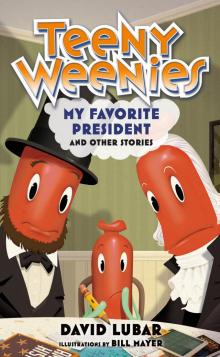 Teeny Weenies: My Favorite President
Teeny Weenies: My Favorite President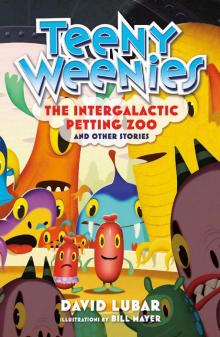 Teeny Weenies: The Intergalactic Petting Zoo
Teeny Weenies: The Intergalactic Petting Zoo Teeny Weenies: The Eighth Octopus
Teeny Weenies: The Eighth Octopus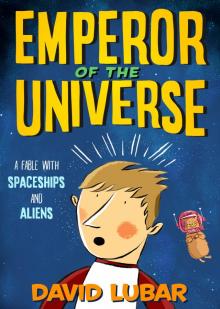 Emperor of the Universe
Emperor of the Universe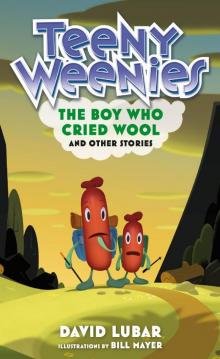 Teeny Weenies: The Boy Who Cried Wool
Teeny Weenies: The Boy Who Cried Wool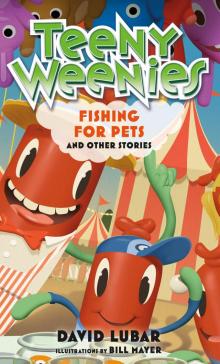 Teeny Weenies: Fishing for Pets
Teeny Weenies: Fishing for Pets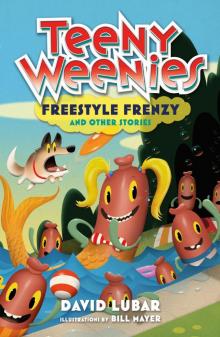 Teeny Weenies: Freestyle Frenzy
Teeny Weenies: Freestyle Frenzy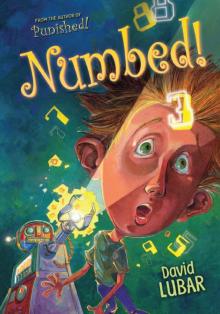 Numbed!
Numbed!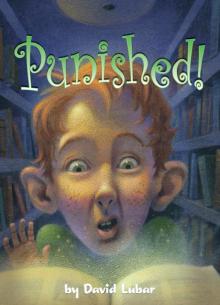 Punished!
Punished!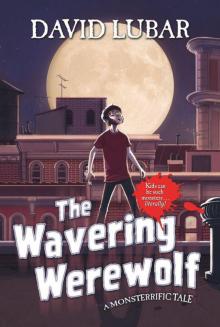 The Wavering Werewolf: A Monsterrific Tale (Monsterrific Tales)
The Wavering Werewolf: A Monsterrific Tale (Monsterrific Tales)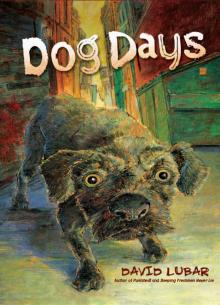 Dog Days
Dog Days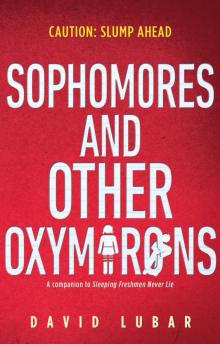 Sophomores and Other Oxymorons
Sophomores and Other Oxymorons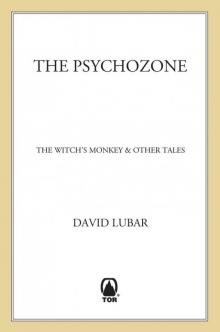 The Psychozone
The Psychozone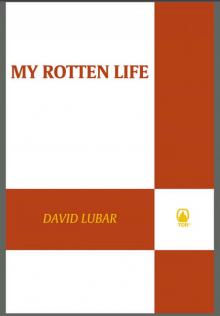 My Rotten Life
My Rotten Life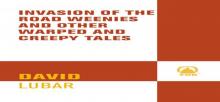 Invasion of the Road Weenies
Invasion of the Road Weenies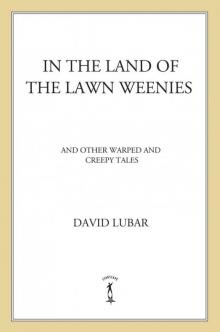 In the Land of the Lawn Weenies
In the Land of the Lawn Weenies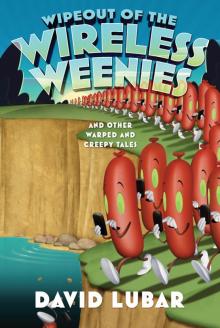 Wipeout of the Wireless Weenies
Wipeout of the Wireless Weenies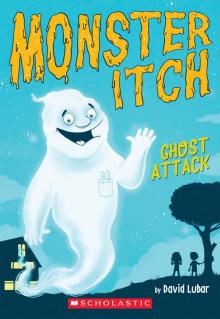 Ghost Attack
Ghost Attack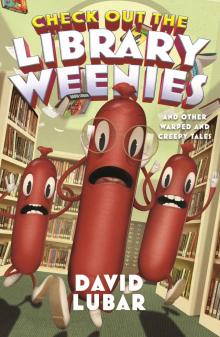 Check Out the Library Weenies
Check Out the Library Weenies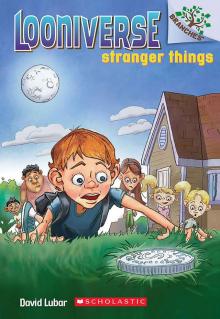 Looniverse #1: Stranger Things (A Branches Book)
Looniverse #1: Stranger Things (A Branches Book)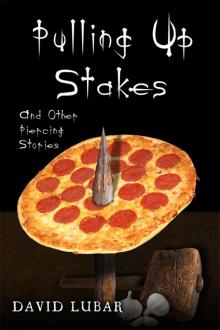 Pulling up Stakes and Other Piercing Stories
Pulling up Stakes and Other Piercing Stories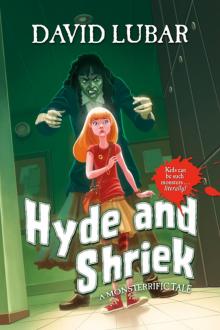 Hyde and Shriek
Hyde and Shriek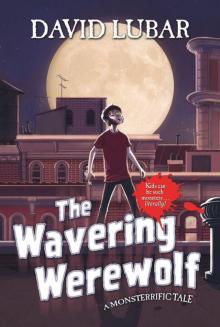 The Wavering Werewolf
The Wavering Werewolf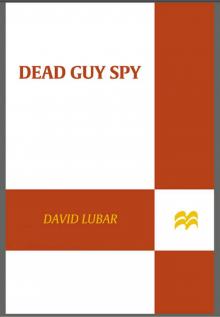 Dead Guy Spy
Dead Guy Spy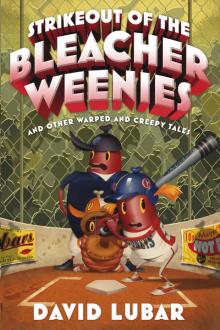 Strikeout of the Bleacher Weenies
Strikeout of the Bleacher Weenies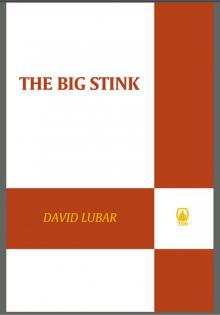 The Big Stink
The Big Stink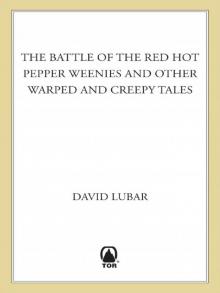 The Battle of the Red Hot Pepper Weenies
The Battle of the Red Hot Pepper Weenies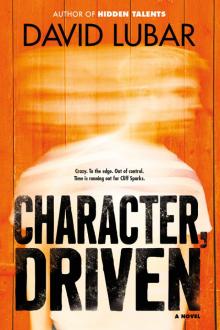 Character, Driven
Character, Driven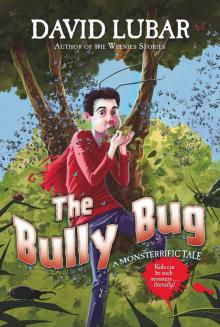 The Bully Bug
The Bully Bug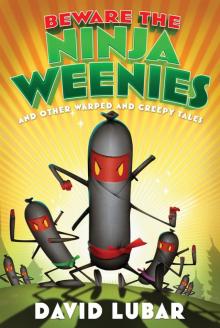 Beware the Ninja Weenies
Beware the Ninja Weenies Extremities: Stories of Death, Murder, and Revenge
Extremities: Stories of Death, Murder, and Revenge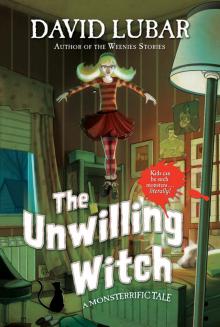 The Unwilling Witch
The Unwilling Witch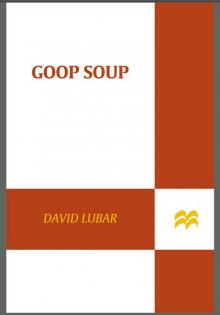 Goop Soup
Goop Soup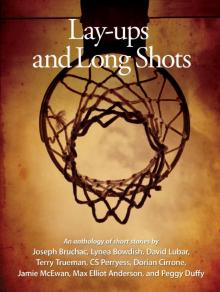 Lay-ups and Long Shots
Lay-ups and Long Shots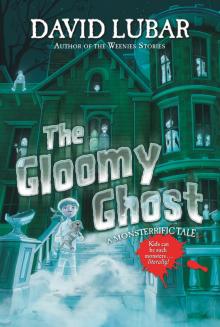 The Gloomy Ghost
The Gloomy Ghost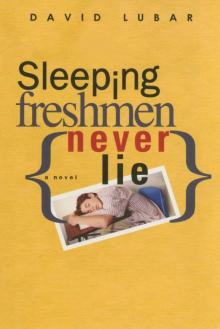 Sleeping Freshmen Never Lie
Sleeping Freshmen Never Lie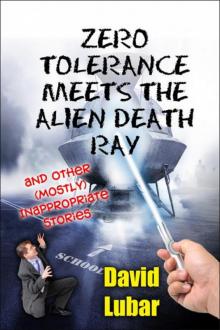 Zero Tolerance Meets the Alien Death Ray and Other (Mostly) Inappropriate Stories
Zero Tolerance Meets the Alien Death Ray and Other (Mostly) Inappropriate Stories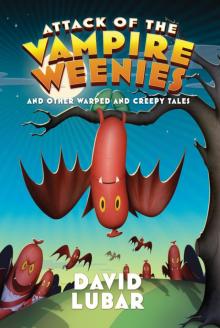 Attack of the Vampire Weenies
Attack of the Vampire Weenies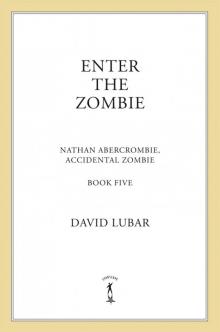 Enter the Zombie
Enter the Zombie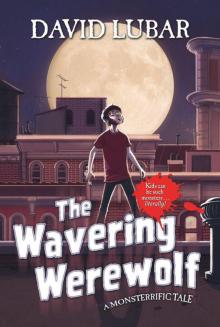 The Wavering Werewolf_A Monsterrific Tale
The Wavering Werewolf_A Monsterrific Tale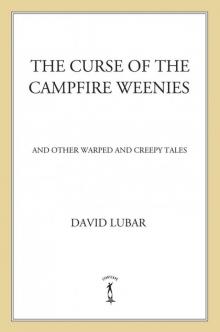 The Curse of the Campfire Weenies
The Curse of the Campfire Weenies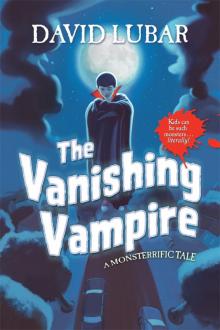 The Vanishing Vampire
The Vanishing Vampire